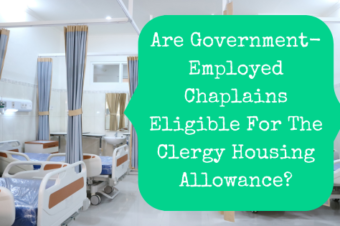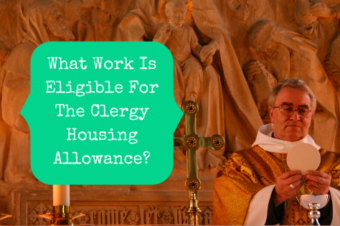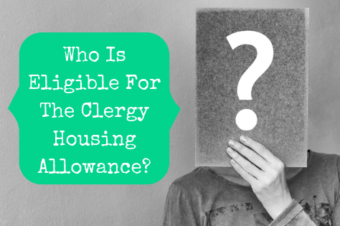The clergy housing allowance is touted as the greatest tax benefit available to pastors. And it really is a great benefit. I learned back in 2019, though, that it can have a dark side. Not a Darth Vader using the Force to crush you kind of a dark side, more like a “If I hadn’t claimed so much, I’d be $1,000 richer” kind of dark side. The problem is how it can affect the Additional Child Tax Credit, which is a major benefit for pastors with children.
How The Clergy Housing Allowance Affects The Child Tax Credit
One of the provisions of the tax reform that passed 5 or so years ago, one of the few points that everyone liked, was the doubling of the Child Tax Credit (CTC). Kids used to be worth $1,000 each and now they are worth $2,000. That still doesn’t feel like enough when your child is laying on the floor screaming, but hey, it’s something, so let’s be thankful for it.
The CTC is credited against your federal income taxes. On your Form 1040, you add up all your income, subtract the standard or itemized deduction, and end up with your taxable income. That taxable income determines your federal income tax. The CTC is then subtracted from the tax so that you won’t have to pay as much.
Income
-Standard/Itemized Deduction
=Taxable Income
Income Tax
-Child Tax Credit (and other credits)
=Taxes Due
The housing allowance lowers your taxable income, which lowers your federal income tax. In fact, I know a lot of pastors are able to completely erase their taxable income between the housing allowance and deductions. No income means no tax due, which means you don’t get to take advantage of the CTC.
But why does that matter if you’ve eliminated your tax bill anyway?
How Income Affects The Additional Child Tax Credit
It doesn’t, really. What matters is the Additional Child Tax Credit (ACTC). The ACTC is the refundable portion of the CTC. That means that it isn’t simply used to cancel out part of your tax bill. The government will actually give you the money, even if you didn’t owe any income taxes in the first place.
On your 2022 tax return, up to 75% of the CTC qualifies for the refundable ACTC. That means the government is willing to pay you up to $1,500 per child. If you have a big family, that is a big deal.
Where the housing allowance comes into play is that your ACTC is limited by your income. It is limited to 15% of your income over $2,500. So, if you use the housing allowance to reduce your income, you also reduce your eligibility for this refund.
Taxable Income
-$2,500
x15%
=Limit on Additional Child Tax Credit
How It Plays Out In Real Life
(This is for illustrative purposes only and does not include things that are immaterial to the subject at hand, such as self-employment taxes and the deductible part of them.)
Let’s say you’re married, you have three children, and you earn $50,000 a year. You take half of that as taxable income and half as a tax-exempt housing allowance. Your tax return would show $25,0000 as income that would be completely eliminated by subtracting the $25,900 standard deduction. So, after the deduction you show no income and, therefore, no income taxes are due.
If you don’t owe income taxes then you can’t take the CTC. However, the ACTC is still available to you. The maximum that you could be eligible for is $4,500 (3 kids x $1,500). But there is still that income limitation.
To calculate your ACTC, you first take your earned income, which was $25,000 in this example. Then subtract $2,500 and you end up with $22,500. You then calculate 15% of that amount, which is $3,375. That is your ACTC. In this example, your housing allowance cost you $1,125 in ACTC ($4,500-$3,375).
$25,000
-$2,500
x0.15
=$3,375 maximum ACTC allowed
What would happen if you had only taken $15,000 as a housing allowance instead of $25,000? On Form 1040 you would have ended up with $9,100 of taxable income ($35,000 income – $25,900 standard deduction). The income tax on that is $908. However, the CTC would have canceled that out and you would not have ended up owing any more than before.
How does the lower housing allowance affect the ACTC?
$35,000
-$2,500
x0.15
=$4,875 new maximum ACTC allowed
Your new limit is $4,875, which is more than the $4,500 you are eligible for. So, lowering your housing allowance increases your ACTC to $4,500. That’s $1,125 more that you get back without increasing your tax bill at all. What could you do with an extra $1,125?
What Should A Pastor Do?
Remember, the clergy housing allowance is a benefit available to you. There is no requirement that you take it. The IRS isn’t going to come after you, mortgage statement in hand. You don’t have to claim a housing allowance and you shouldn’t if it is costing you money.
If you have kids and a lower income, you really need to look into this. Check your 2022 tax return to see if you got the full Additional Child Tax Credit. If not, play around with the numbers. Calculate your tax bill with different housing allowance amounts to see how the final results are affected. Now is a great time to do it since you can use your 2022 return numbers to determine how much of a housing allowance you should be taking in 2023.
Remember, the Bible says that children are a blessing. So let’s make sure you get all of the financial blessings you’re entitled to!





